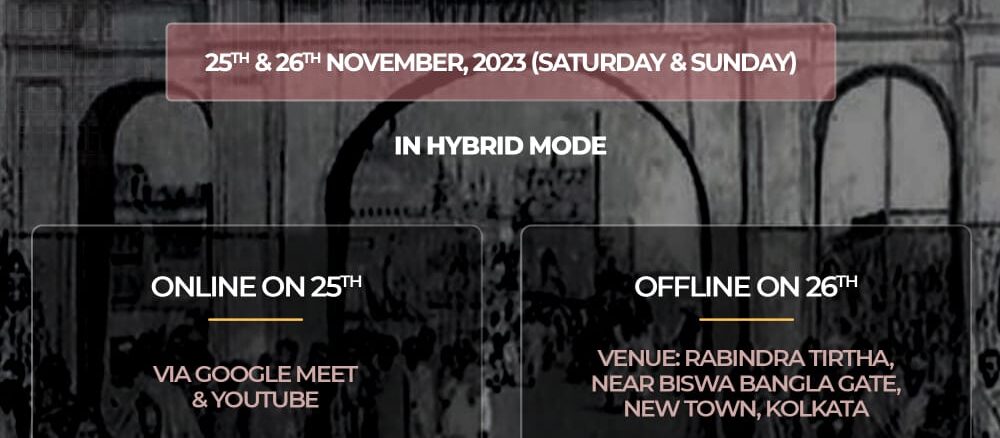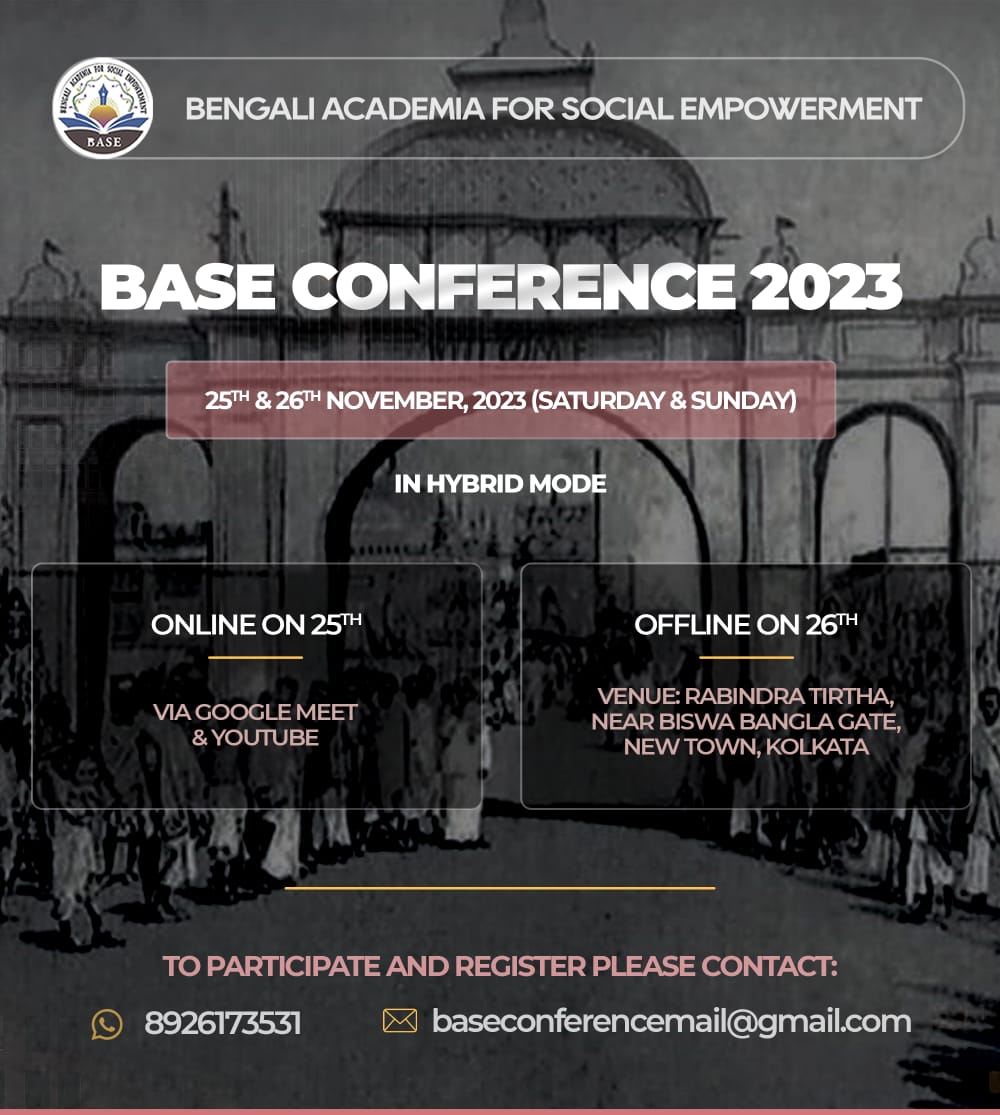
Bengali Academia for Social Empowerment (BASE), Kolkata, West Bengal
in Collaboration with
Department of English, Dr. B. R. Ambedkar College, Betai, Nadia, West Bengal
Organise
A Two-Day International Conference (In Hybrid Mode)
On
Muslim Life and Culture in Colonial Bengal
*25th & 26th November 2023 (Saturday & Sunday)*
*Offline Venue: Rabindra Tirtha, Near Biswa Bangla Gate, New Town, Kolkata*
Concept Note:
Islam was introduced to the people of Bengal through the migration of Sufi saints in the 11th century. However, it spread in Bengal under the Muslim rulers, who reigned in Bengal for more than five-and-a-half centuries, beginning with Bakhtiyar Khilji in 1204. The East India Company brought the Muslim rule to its end defeating Nawab Siraj-ud-Daulah in 1757. During the Sultanate and the Mughal era Bengal saw the growth of a “civilization based on tolerance, harmony, social liberalism, and human welfare (Siddiq and Habib, 2017). The historical region of Mediaeval Bengal (1204-1757 CE) encompassed not just present-day West Bengal and Bangladesh, but also extended to include portions of Tripura, Bihar, Assam, Jharkhand, and Orissa, where the Bengali language was predominantly spoken. Bengal rulers prioritized social cohesion. Every person was considered an equal citizen of the society, not on the basis of ones ethnic or religious identity, but on his or her humanity (Siddiq and Habib, 2017). The Muslim rulers of Bengal built up institutions such as maktab, madrasahs, khanqahs and mosques for education, spiritual activities and prayers. Muslim Scholars such as Ulama and Mashayikh enjoyed economic security so that they could engage themselves in the pursuit of knowledge and meditation.
With the advent of colonialism, Bengal witnessed an adverse effect on cultural and economic prosperity of Muslims. During this period of political crisis and transfer of power from the Nawabs to the British East India Company, Muslims maintained a distance from the British. Muslim leaders preferred their traditional educational system, particularly Arabic, Persian and Urdu rejecting English education. The social, educational and political isolation of Muslims increased further with religious reformist movements such as Wahabi and Faraizi. Undoubtedly, colonial modernity posed a challenge to the Bengali Muslims but it also opened up possibilities for them as it did for other religious communities of Bengal. Consequently, there was a change in scenario towards the end of the nineteenth century and early twentieth century. Around this time (1872-1891), the census was conducted and debates and discussions regarding the question of Bengali Muslims identity started emerging. There was a conscious effort to create a political and cultural space for Bengali Muslims. While political leaders played a key role in this, important role was also played by writers and intellectuals from the community. Khondkar Shamsuddin, Meer Mosharraf Hossain, Munshi Meherullah, Munshi Jamiruddin, Sheikh Fazlul Karim, Mozammel Huq and Qazem al-Qureshi were important Muslim writers from this period. The Moslem Chronicle, Mihir O Sudhakar, The Sudhakar, Mihir (The Sun), Islam Pracharak, Ahmadi, the Hindu-Mussalman Sammilani, Kohinoor and Naba Nur (New Light) were important newspapers, magazines and journals that played a remarkable role to form a new consciousness among Muslims.
*Themes:*
The conference seeks to investigate Muslim life and culture in colonial Bengal from a variety of perspectives. Academicians, Research Scholars, Faculty members, professionals and others are invited to submit their original and unpublished research papers in English or Bengali for consideration for presentation. The presentation may be related (but not confined) to the following sub-themes:
Muslim Women in Colonial Bengal
Bengali Muslims in Historical Perspectives
Bengali Muslim Writers and Colonial Discourse
Census and Identity Formation in Colonial Bengal
Economic Condition of Muslims in Colonial Bengal
Power, Politics, Bengali Muslims and Colonial Bengal
Contribution of Important Bengali Muslim Personalities
Transforming the Nature of Muslims in Colonial Bengal
Educational Development of Muslims in Colonial Bengal
Social and Political Activities of Muslims in Colonial Bengal
Folk Forms, Oral Culture and Bengali Muslims in Colonial Era
Bridging Bengali Culture and Islamic Ideology in Colonial Bengal
Journals, Magazines, Pamphlets and Bengali Muslims in Colonial Era
Reshaping Bengali Muslim Identity through English Language in Colonial Era
*Submission Guidelines:*
Abstract: Around 300 words (with 5 keywords)
Abstract to be emailed to baseconferencemail@gmail.com
Font: Times New Roman; Size: 12; Spacing: Double space; Alignment: Left
MLA 9th Edition must be followed for citation of the articles
*Dates to Remember:*
Last Date of Abstract Submission: 15 November 2023
Last Date of Online Registration: 18 November 2023
Submission of Rough Paper (2,000 – 3,000 words): By 20 November 2023
Announcement of Final Schedule: 22 November 2023
Dates of Conference: 25 & 26 November 2023
Final Paper Submission for Publication (3,000 – 5,000 words): 31 December 2023
*Registration Fees:*
Student: Rs. 200/-
Scholar: Rs. 300/-
Faculty/Professionals: Rs. 500/-
(Rs. 100/- less in all categories for BASE paid members of current financial year)
Publication: After the conference selected papers will be published in an edited volume.
*Contact Information:*
BASE Conference Team
+91 8926173531 (WhatsApp Only)
Email: baseconferencemail@gmail.com

